Is losing whiskers good luck ever thought losing whiskers could be good luck for your cat? The idea has puzzled cat owners for ages. Whiskers are not just cute; they’re vital for a cat’s sense of the world.
Is losing whiskers a sign of good luck? Some believe it might mean positive changes. But, the truth is quite different. These special hairs are key to a cat’s understanding of its surroundings.
Cats use their whiskers to check tight spots and feel air changes. Each whisker is full of nerve endings, giving cats vital info. Losing whiskers isn’t luck; it could mean health issues that need looking into.
Wondering about whisker loss? This article will clear up myths and explain the science. You’ll learn what happens when your cat loses these important sensory tools.
Table of Contents
Understanding Cat Whiskers: Their Purpose and Importance
Cat whiskers are more than just decorations. They are vital tools for cats to explore their world. These special hairs help cats move and sense their surroundings with great skill.
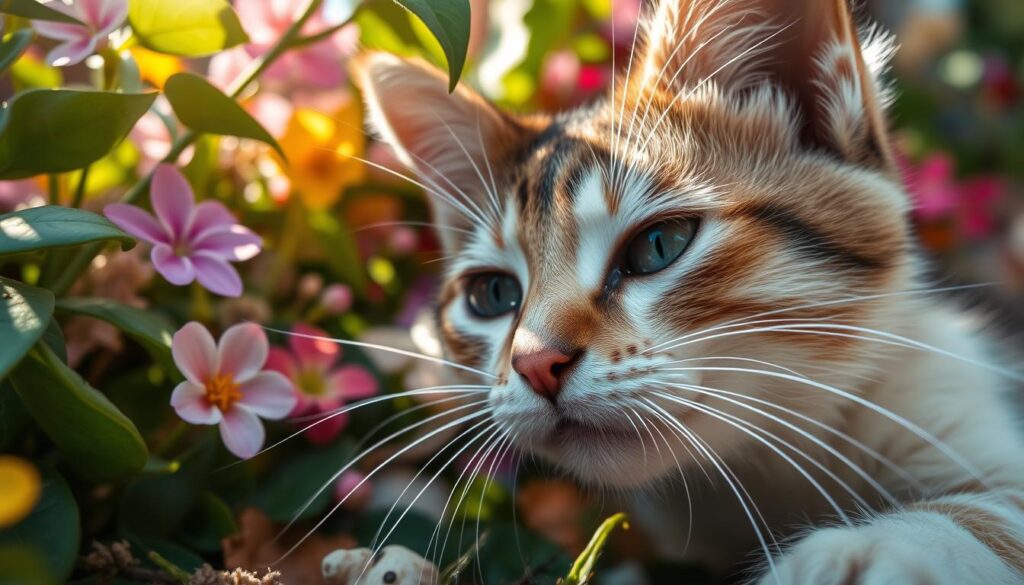
Whiskers are not just regular hairs. They are special tools that let cats feel their world in ways we can’t. Many cat owners wonder about the myth of losing whiskers, finding it fascinating.
What Are Whiskers Made Of?
Whiskers, or vibrissae, are made of strong protein called keratin. They are different from regular fur because they are:
- Thicker and stiffer
- Deeply rooted in sensitive nerve endings
- Strategically positioned on a cat’s face
How Do Whiskers Help Cats?
Whiskers are key for cats to perform many important tasks. They help cats:
- Measure tight spaces
- Detect air currents
- Keep their balance
- Show their emotions
The Sensory Role of Whiskers
Whiskers work like advanced radar systems. They allow cats to:
- Detect tiny air movements
- Measure distances accurately
- Move around in the dark
“Whiskers are a cat’s ultimate sensory superpower” – Feline Behavior Experts
These amazing sensors give cats a deep understanding of their world. This makes the myth of losing whiskers even more interesting to cat lovers.
| Whisker Characteristic | Functional Detail |
|---|---|
| Length | Typically width of cat’s body |
| Sensitivity | Extremely high nerve concentration |
| Location | Around mouth, above eyes, on cheeks |
Common Reasons Why Cats Lose Whiskers
Cat whiskers are more than just hair. They help your cat feel and move around. Knowing why cats lose whiskers helps you care for them better and spot health problems.
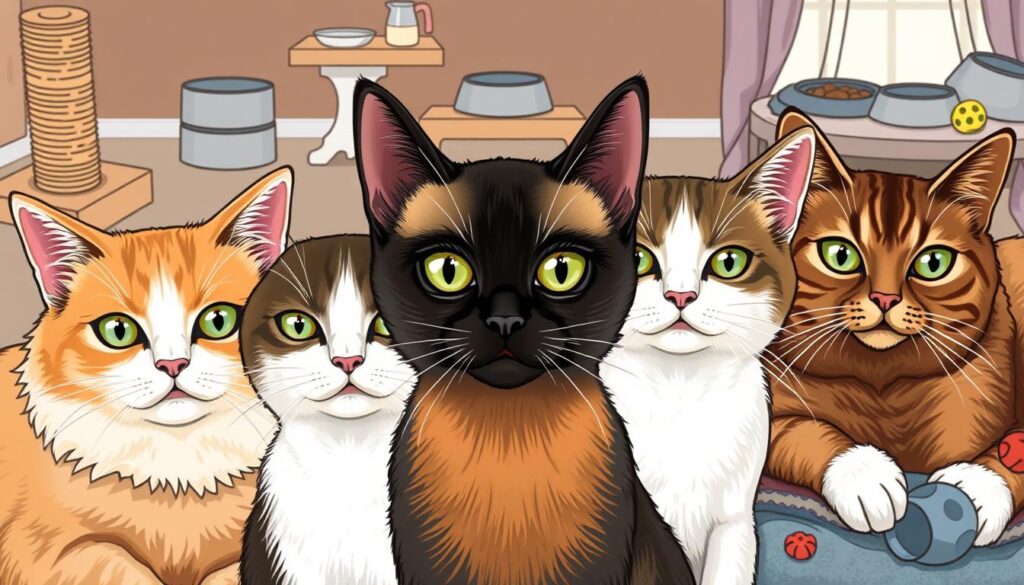
Cats lose whiskers for many reasons, both natural and from their environment. While some loss is okay, too much might mean there’s a problem.
Natural Shedding Process
Whisker loss is normal for cats. Like all hair, whiskers grow, fall out, and grow back. This cycle is part of their natural life.
Health Issues Related to Whisker Loss
Many health problems can cause whisker loss. These include:
- Skin infections
- Allergic reactions
- Hormonal imbalances
- Nutritional deficiencies
Environmental Factors Affecting Whiskers
Things outside can also harm whiskers. These include:
| Environmental Factor | Potential Impact |
|---|---|
| Rough surfaces | Mechanical whisker breakage |
| Tight spaces | Whisker stress and potential loss |
| Chemical exposures | Skin irritation and follicle damage |
“A cat’s whiskers are more than decoration—they’re a complex sensory tool that helps them navigate the world.” – Veterinary Expert
While some whisker loss is normal, too much needs a vet’s check. This ensures your cat stays healthy and happy.
Is Losing Whiskers a Sign of Good Luck?
Cats have long been surrounded by myths and superstitions, including their whiskers. Losing whiskers has interesting meanings in different cultures.
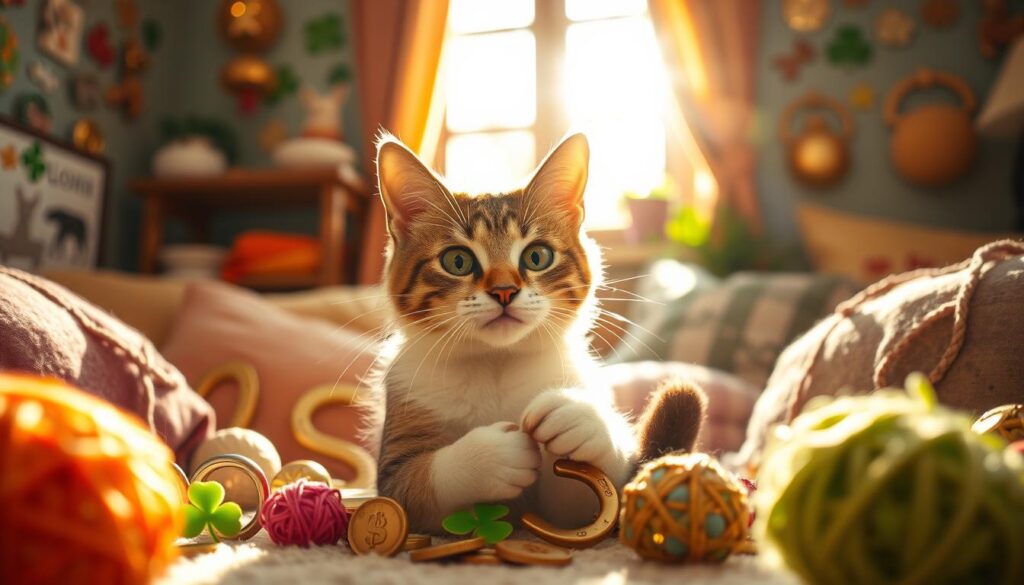
The superstition about losing whiskers comes from many cultures. Some believe it’s a mystical sign, while others see it as a natural part of a cat’s life.
Cultural Beliefs Around Whisker Loss
- In some folkloric traditions, a cat losing whiskers is considered a potential harbinger of change
- Some cultures interpret losing whiskers meaning as a spiritual transformation signal
- Regional beliefs often connect whisker loss to potential future events or personal transitions
Superstitions and Their Origins
For centuries, people have seen magic in animal behaviors. The losing whiskers superstition comes from old observations and misunderstood natural processes.
“Whiskers are more than just facial hair – they’re a window into a cat’s mysterious world.” – Feline Behavior Experts
Scientific Perspective on Whisker Loss
From a scientific view, whisker loss is a normal part of life. Veterinarians say cats shed whiskers as their bodies renew themselves.
| Cultural Interpretation | Scientific Understanding |
|---|---|
| Mystical sign of change | Natural biological replacement |
| Spiritual transformation | Periodic whisker regeneration |
| Potential future prediction | Normal health maintenance |
While superstitions are interesting, whisker loss doesn’t mean luck. The best way to keep your cat healthy is with regular vet visits.
The Emotional Impact of Whisker Loss on Cats
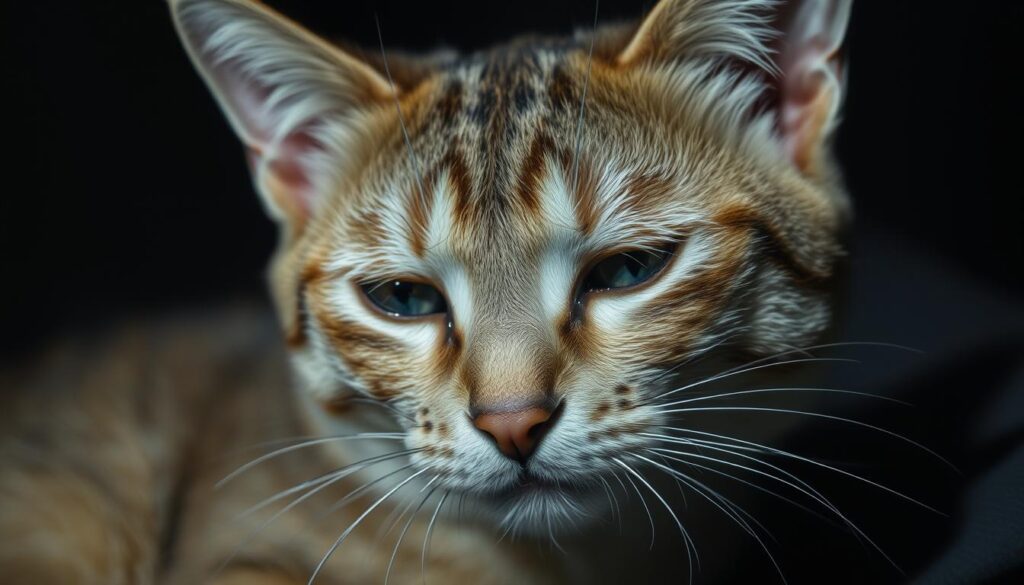
Cats use their whiskers to navigate and feel emotions. Losing whiskers can make them feel stressed and uncomfortable. Knowing how to help your cat during this time is important.
Signs of Discomfort or Stress
Whisker loss can upset cats in many ways. Different cultures see it differently, but cats show clear signs of stress:
- Reduced confidence in spatial awareness
- Increased anxiety during movement
- Hesitation when approaching food or water bowls
- Unexpected changes in personality
Behavioral Changes to Watch For
Is losing whiskers good luck? Cultural views vary, but your cat’s actions will show the real effect. Look for these changes:
- Decreased interest in exploration
- Unusual hiding behaviors
- Reduced playfulness
- Potential aggression when feeling vulnerable
When to Consult a Veterinarian
If your cat’s behavior or mood doesn’t change, see a vet. They can check if whisker loss is due to health issues. They’ll help your cat feel better emotionally.
“Understanding your cat’s emotional landscape is key to providing compassionate care during whisker changes.” – Feline Behavior Specialist
Caring for Your Cat After Whisker Loss
Whisker loss can be tough for cats, affecting their sense of space. It’s not about bad luck, but about how to help your cat feel better.
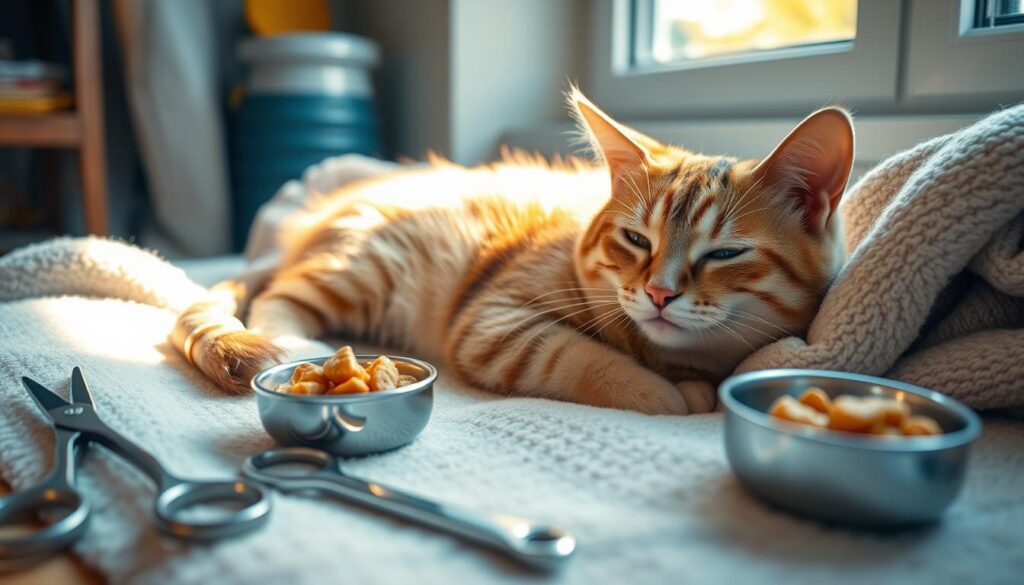
Cats use their whiskers to navigate and understand their surroundings. Losing them can make them feel lost. It’s important to create a supportive space for them to adjust.
Creating a Safe and Comfortable Space
To help your cat after whisker loss, try these tips:
- Minimize sudden changes in their environment
- Keep familiar objects in their usual spots
- Provide soft, cozy places to rest
- Reduce stressors
Mental Stimulation Techniques
Activities can help boost your cat’s confidence after whisker loss:
- Use toys that don’t rely on whisker sensitivity
- Play gently with them
- Try puzzle feeders to keep their mind sharp
- Give them gentle, reassuring touch
Monitoring Health and Behavior
Watching your cat closely is crucial during whisker loss. Look out for:
- Changes in eating habits
- Difficulty navigating
- Signs of stress or anxiety
- Potential health issues
“Patience and understanding are your best tools in helping your cat adjust to whisker loss.” – Veterinary Behaviorist
While whisker loss might worry you, most cats recover well with care. Always talk to your vet if your cat’s behavior or health changes.
How to Prevent Whisker Loss in Cats
To keep your cat’s whiskers safe, you need to act early. Losing whiskers might be seen as lucky by some. But most cat owners want to avoid whisker damage. Learning how to care for these sensitive hairs is key to your cat’s health and happiness.

Cats use their whiskers to navigate and sense their surroundings. To prevent whisker loss, you need to focus on your cat’s overall health.
Regular Grooming Techniques
Gentle grooming is vital for whisker health. Here are some important steps:
- Use soft-bristled brushes
- Avoid touching or pulling whiskers directly
- Check for any signs of breakage or damage
- Clean around whisker areas without disturbing them
Creating a Safe Living Environment
Beliefs about losing whiskers often come from the environment. Make a safe space by:
- Removing narrow spaces that might snag whiskers
- Using wide food and water bowls
- Keeping tight spaces clear of potential hazards
- Preventing rough play with other pets
Nutrition for Whisker Health
| Nutrient | Benefit for Whiskers | Recommended Sources |
|---|---|---|
| Protein | Supports hair and whisker growth | Chicken, Fish, Lean Meats |
| Omega-3 Fatty Acids | Improves coat and whisker strength | Salmon Oil, Fish Supplements |
| Biotin | Enhances hair follicle health | Egg Yolks, Liver |
By following these tips, you can protect your cat’s whiskers. This helps support their sensory abilities.
“A cat’s whiskers are more than just hair – they’re a complex sensory system that helps them understand their world.” – Veterinary Whisker Expert
The Role of Nutrition in Whisker Health
Nutrition is key to keeping your cat’s whiskers healthy. Losing whiskers often comes from not getting enough nutrients. Good food helps your cat’s whiskers stay strong and helps them move around better.

Essential Nutrients for Cats
Cats need certain nutrients for healthy whiskers and overall health. Here are the main nutrients important for whisker health:
- High-quality protein
- Omega-3 fatty acids
- Biotin
- Vitamin A
- Zinc
Foods to Enhance Fur and Whiskers
Some foods can make your cat’s whiskers stronger and look better. Add these nutrient-rich foods to their diet:
| Food | Nutritional Benefit |
|---|---|
| Salmon | Rich in Omega-3 fatty acids |
| Eggs | High-quality protein source |
| Chicken liver | Packed with biotin and vitamins |
Supplements for Optimal Cat Health
While food is crucial, some cats might need extra help. Supplements can help with whisker health. Always talk to your vet before adding new supplements to your cat’s diet.
“A balanced diet is the foundation of your cat’s health, including their magnificent whiskers.” – Veterinary Nutrition Expert
Every cat is different. Watch their diet and whisker health closely. Regular vet visits are also important to keep your cat healthy and happy.
Understanding Whisker Fatigue
Cats are very sensitive, and their whiskers are key to their world view. Whisker fatigue is a condition that affects their daily life and behavior.
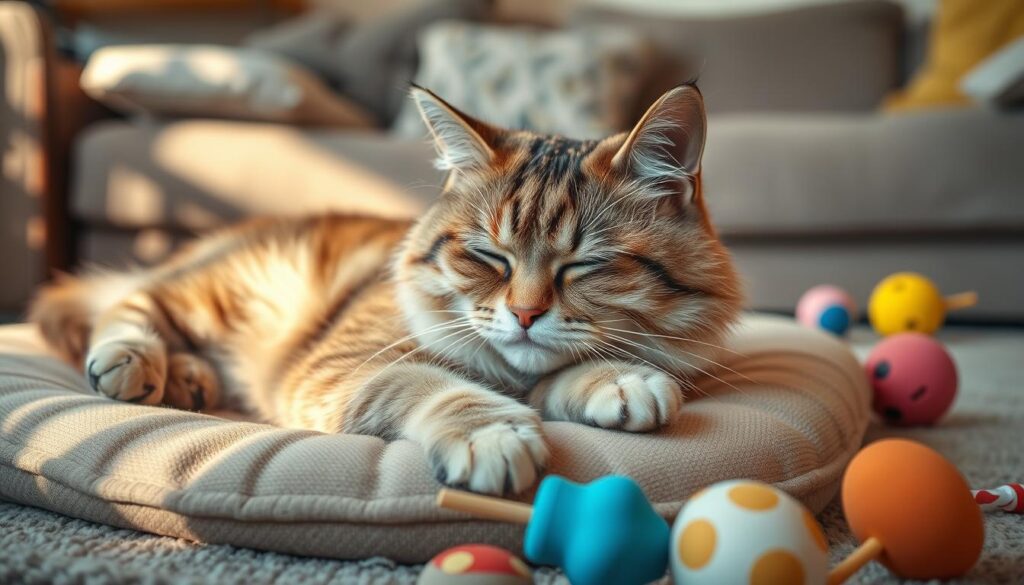
Whisker fatigue is more than just hair loss. It’s about the sensory system that helps cats move around. When these sensitive tools get too much stimulation, it can be a problem.
What Exactly Is Whisker Fatigue?
Whisker fatigue happens when a cat’s whiskers get too much sensory input. These vibrissae are linked to the cat’s nervous system. They can get overwhelmed easily.
Recognizing Symptoms of Whisker Fatigue
- Reluctance to eat from deep food bowls
- Pawing at food or water before eating
- Increased irritability or stress
- Unexplained changes in eating habits
Practical Solutions to Alleviate Whisker Stress
Many people don’t know how to help with whisker health. Here are some tips:
- Use wide, shallow feeding dishes
- Minimize unnecessary touching of whiskers
- Provide calm, low-stimulus environments
- Regularly check for signs of sensory overload
“A cat’s whiskers are more than just cute facial hair – they’re a sophisticated sensory tool that requires understanding and respect.” – Feline Wellness Expert
Understanding and fixing whisker fatigue can really help your cat. By meeting their sensory needs, you can make them feel better and less stressed.
When to Seek Veterinary Advice for Whisker Loss
Cat whiskers are more than just cute facial features. They play a crucial role in your feline’s sensory experience. While some whisker loss is normal, certain situations demand professional attention. Understanding when to seek veterinary advice can protect your cat’s health and well-being.
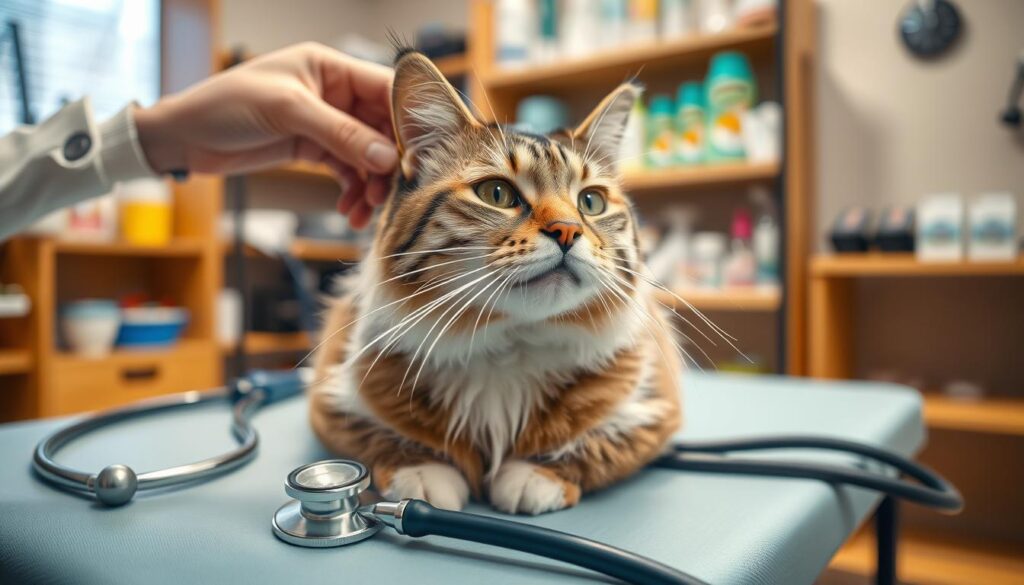
Critical Indicators Requiring Immediate Attention
Not all whisker loss is a sign of good luck. Some situations signal potential health concerns that need professional evaluation. Watch for these red flags:
- Sudden and extensive whisker loss
- Accompanying skin irritation or inflammation
- Changes in eating or grooming behaviors
- Visible discomfort or behavioral shifts
Understanding Veterinary Check-Up Importance
Routine veterinary check-ups are essential for monitoring your cat’s overall health. About 60% of veterinarians recommend a thorough examination if a cat experiences sudden whisker loss. These check-ups can help identify underlying conditions early.
| Whisker Loss Concern | Percentage of Cases |
|---|---|
| Allergies | 20% |
| Skin Infections | 25% |
| Stress-Related Issues | 30% |
| Underlying Health Conditions | 10% |
What to Expect During a Veterinary Visit
When visiting the vet about whisker loss, expect a comprehensive examination. The superstition about losing whiskers might suggest luck, but professional assessment is crucial. Your veterinarian will likely:
- Conduct a physical skin examination
- Review your cat’s medical history
- Perform potential blood tests
- Assess overall health and behavior
“Early detection can prevent more serious health complications” – Veterinary Health Experts
Remember, while is losing whiskers good luck might be an interesting cultural belief, your cat’s health should always be the priority. Stay observant and proactive in your feline’s care.
The Connection Between Whiskers and Feline Identity
Cats have a special way of communicating that goes beyond just meows and body language. Their whiskers are key in showing emotions, moving around, and understanding their world. The idea that losing whiskers is bad misses how important these tools are to a cat’s life.
Whiskers are not just hair. They are advanced sensors that help cats see their world clearly. Thinking whiskers are bad is based on how vital they are to a cat’s sense of self.
Whiskers as a Form of Expression
Cats use their whiskers to share deep feelings and plans. They show emotions by how they hold their whiskers:
- Forward-pointing whiskers mean they’re curious and excited
- Pulled back whiskers show fear or anger
- Relaxed whiskers mean they’re calm
How Cats Use Whiskers in Communication
Whiskers are more than just social tools. They help cats understand their space, emotions, dangers, and hunting skills. They give vital info about:
- Knowing their space
- Feeling emotions
- Finding threats
- Being good hunters
The Impact of Whisker Loss on Their Personality
When cats lose their whiskers, it can mess with their confidence and sense of space. Without these sensors, cats might feel:
- Lost
- Scared
- Less ready for changes
“A cat’s whiskers are like an emotional and physical radar system that helps them navigate their world with precision and confidence.” – Feline Behavior Specialist
| Whisker Function | Communication Impact |
|---|---|
| Spatial Awareness | High Precision Navigation |
| Emotional Expression | Detailed Mood Signaling |
| Threat Detection | Immediate Environmental Assessment |
Knowing how whiskers connect to a cat’s identity helps owners see how vital these tools are for their pet’s happiness.
Myths and Misconceptions About Cat Whiskers
Cat whiskers are fascinating sensory tools that often spark curiosity and misunderstanding. Many pet owners have heard various myths about these delicate facial hairs. These myths can lead to misconceptions about their significance and luck beliefs.
Let’s explore some of the most common myths surrounding cat whiskers and separate fact from fiction.
Debunking Common Whisker Myths
- Myth: Cats can perfectly measure spaces with their whiskers
While whiskers help cats gauge space, they aren’t precise measuring tools. Cats still rely on their overall body awareness and spatial intelligence.
- Myth: Cutting whiskers doesn’t harm cats
Cutting a cat’s whiskers can severely disorient them. These sensory hairs are crucial for navigation and spatial perception.
- Myth: Longer whiskers mean a healthier cat
Whisker length varies by breed and individual cat. Length isn’t a direct indicator of overall health or well-being.
The Truth About Whisker Length and Health
Whiskers are more than just decorative facial hair. They’re sophisticated sensory organs that help cats understand their environment. A cat’s whiskers provide critical information about surrounding spaces, air movements, and potential obstacles.
Understanding Breed-Specific Whisker Characteristics
Different cat breeds have unique whisker characteristics. Some breeds naturally have longer or more prominent whiskers. This doesn’t necessarily correlate with their health or capabilities.
“Whiskers are a cat’s GPS, radar, and communication tool all in one.” – Veterinary Whisker Specialist
Understanding these myths can help you appreciate your cat’s remarkable sensory abilities. It also helps provide better care for their unique whisker needs.
The Importance of Regular Grooming for Cats
Grooming is key for cat care, not just for looks. It keeps your cat’s whiskers and health safe. This stops bad superstitions about losing whiskers.
Good grooming is crucial for your cat’s health and happiness. Cats are naturally clean, but they need your help. This keeps them healthy and comfy.
Essential Grooming Tools for Cat Owners
- Soft-bristled brush
- Metal comb with wide and narrow teeth
- Nail clippers designed for cats
- Gentle pet wipes
- Rubber grooming glove
How Grooming Impacts Whisker Health
Grooming affects your cat’s whiskers a lot. Soft brushing removes loose fur and stops mats. This keeps whiskers from getting stressed.
| Grooming Technique | Whisker Impact | Recommended Frequency |
|---|---|---|
| Soft Brushing | Minimal Stress | 2-3 times weekly |
| Harsh Brushing | High Whisker Stress | Avoid |
| Gentle Combing | Low Stress | Once weekly |
Creating the Perfect Grooming Routine
Make a grooming plan that fits your cat’s personality. Start with short times and grow it. Give treats to make grooming fun.
“Grooming is not just about keeping your cat clean, it’s about building trust and maintaining their physical health.” – Veterinary Grooming Expert
Every cat is different. Watch how your cat reacts and adjust grooming. Being patient and gentle keeps whiskers healthy and strengthens your bond.
Whisker Loss in Different Cat Breeds
Cat whiskers are special for each breed, showing interesting differences. These differences affect how they feel their surroundings. Knowing how different breeds handle whisker loss helps you care for your cat better.
Short-Haired vs. Long-Haired Breed Differences
Short-haired cats show whisker changes more clearly. Long-haired cats might hide these changes better.
- Short-haired breeds: More noticeable whisker loss
- Long-haired breeds: Subtle whisker changes
- Whisker density varies by breed type
Breed-Specific Whisker Characteristics
Is losing whiskers good luck? Each breed reacts differently to whisker loss. Some are more sensitive than others.
| Cat Breed | Whisker Sensitivity | Adaptation Rate |
|---|---|---|
| Siamese | High | Quick |
| Maine Coon | Moderate | Gradual |
| Persian | Low | Slow |
How Breeds React to Whisker Loss
Each cat breed handles whisker loss in its own way. Genetic factors are key in how cats adjust to changes in their world.
“Whiskers are more than just facial hair – they’re a complex sensory tool unique to each cat breed.” – Veterinary Feline Specialist
Watching your cat’s behavior and talking to a vet can help you understand how your breed reacts to whisker changes.
Reassessing Your Cat’s Environment and Wellness
Keeping your cat’s environment stress-free is vital for their health. It helps avoid whisker problems. Knowing about the myth of losing whiskers can make your home better for your cat.
Evaluating Stress Triggers in the Home
Cats can get stressed from many things around them. The myth of losing whiskers is linked to stress and anxiety. Look out for these stressors:
- Sudden changes in household routine
- Introduction of new pets or family members
- Loud noises or frequent disruptions
- Limited personal space for your cat
The Importance of Enrichment Activities
Keeping your cat’s mind and body active can lower stress. Enrichment activities prevent whisker fatigue and boost well-being. Try these:
- Interactive toys that engage hunting instincts
- Vertical spaces like cat trees
- Puzzle feeders
- Regular play sessions
Creating a Harmonious Space for Your Cat
Make your home cat-friendly to support their natural behaviors and reduce stress. Here’s how to create a peaceful space:
| Area | Recommendations |
|---|---|
| Resting Spaces | Provide multiple quiet, comfortable zones |
| Scratching Areas | Install scratching posts in different locations |
| Litter Box Placement | Keep in quiet, accessible areas away from food |
“A calm cat is a healthy cat. Creating a supportive environment is key to their well-being.” – Veterinary Behaviorist
By understanding your cat’s needs and reducing stress, you can prevent whisker problems. This makes your home a nurturing place for them.
Conclusion: The Significance of Whiskers in Your Cat’s Life
Understanding your cat’s whiskers is more than just curiosity. These special tools are key to your cat’s daily life. They help your cat sense their surroundings, making up about 30% of their sensory input.
Some believe losing whiskers is unlucky. But, the truth is, whisker health is vital for your cat’s happiness. It’s not about luck, but about keeping your cat’s whiskers in good shape.
Your cat’s whiskers are not just hair. They help your cat navigate and communicate. They detect changes in their environment. Losing whiskers is normal, but keeping them healthy is important.
Knowing your cat’s needs means understanding their whiskers. Cats lose 10-15 whiskers each month. It’s important to watch for any changes and keep them healthy. This way, your cat can feel safe and happy.
Caring for Your Feline Friend
Get to know your cat’s sensory world. By watching their whiskers, you’re not just following a superstition. You’re really helping your cat’s health and happiness. Your care makes a big difference in your cat’s life.
